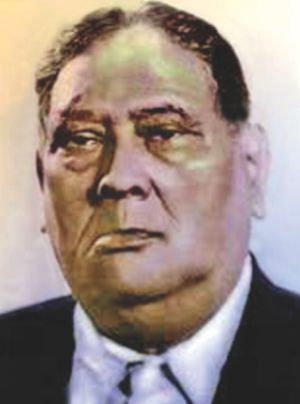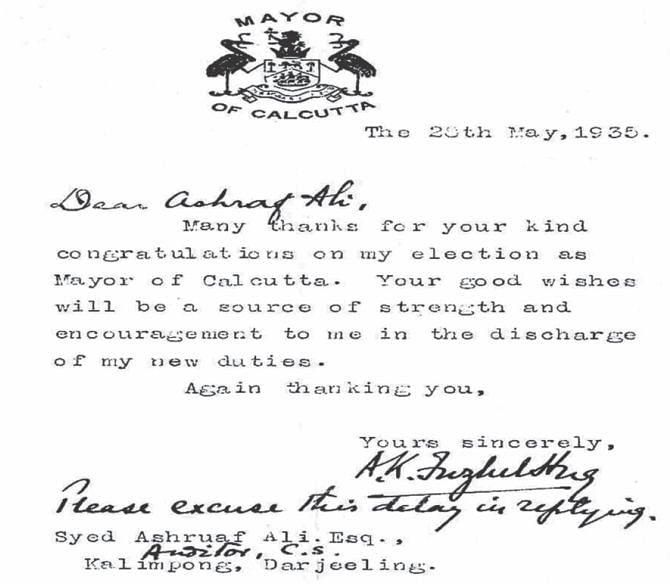Remembering Sher-e-Bangla

OCTOBER 26 was the 141st birth anniversary of Sher-e-Bangla A.K. Fazlul Huq, a red letter day in the chronicle of our nation's calendar. He was born in 1873 at his grandparents' village home at Saturia in Jhalakathi district. A unique figure in the political firmament, Sher-e-Bangla realised early in public life the urgency of ridding the rural people of the age-old debt-trap of the money lenders, and the all-pervasive curse of illiteracy -- pre-requisites for an inclusive society which he envisioned. The enactment of the debt settlement bill in 1938 and measures that he initiated to promote education in the country were the high-water marks of his eventful public life.
What was most outstanding about him was his all-encompassing popularity among the people -- from the tillers of the land to the urban gentry -- a rare quality for any politician anywhere. Despite his comment “in my stormy and chequered life, chance has played more than her fair part,” he always remained unwaveringly focused on his commitment to public welfare. His profound compassion for the hapless humanity is legendary. He would never deny charity to anyone who sought it, even if it entailed a grave personal risk. What defined him most was that he belonged to his people, he was their sovereign.
The distinguished bearing of Sher-e-Bangla was rooted in the pedigree of his illustrious family. The polished manners which are so difficult to attain and so strictly personal do not come by so easily, and when attained are acclaimed in the society. When the carriage, gait, voice, talent of not offending, the candor and expression are bound up in one individual character we are in the company of a true gentleman. Sher-e-Bangla, by all counts, fitted the bill eminently as his life spanning more than 8 decades would convince us of that beyond any doubt. Many unknown small facts as they unfold, unveil his image in a new and vivid way. The following anecdotal nuggets of his life filled the social fabric so touchingly.
In 1935, when Sher-e-Bangla was elected Mayor of Calcutta -- incidentally the first Muslim mayor -- he was virtually deluged with congratulatory letters. Normally, replies to such letters are couched in usual clichés. One such letter written by Sher-e-Bangla to his friend, my father, however, was different from that style. An image of the letter is given below.

Sher-e-Bangla's addition to the original typed letter in his own handwriting to extend courtesies -- which was well beyond formality -- lent a human face to the dreary typed letter, a superb assertion in the realm of inter-personal relationship. It was not an impulsive or chance happening, rather a positive statement of our traditional elite culture. Today, such niceties, more often than not, are seen as 'old world' courtesies under the shadowy impact of the e-mail culture. One may even perceive a 'fashionable' tendency to ignore the virtues of yesteryears. Our fascination with the so-called 'old world' culture intertwined with ardent family values are still alive and rooted deep in our social psyche. Sher-e-Bangla's letter to his friend is a fine example of our cultural heritage.
In 1954, Sher-e-Bangla along with two other political stalwarts, Hussein Shaheed Suhrawardy and Moulana Abdul Hamid Khan Bhashani, led the United Front to victory in the electoral battle against the powerful Muslim League. In his pre-election campaign to mobilise public opinion in favour of the United Front, he embarked on a tour outside Dhaka. At Bhairab, Sher-e-Bangla along with four student leaders who accompanied him from Dhaka, stayed overnight at the local dak bunglow. After dinner, Sher-e-Bangla wanted to know from the caretaker if each of the student leaders was provided with mosquito-net. Apologetically, the caretaker replied he had only one mosquito net which was meant for him (Sher-e-Bangla). Sher-e-Bangla was shocked, and opted to spend the night without mosquito-net and endure night-long mosquito bites along with his student comrades. He was obviously moved by his sense of fairness and equity.
Sher-e-Bangla was wedded to the soil, certain of his belief, antithesis to anything anti-Bengali. He was as much a part of our history as we are of the land of our mother tongue.
The writer is a former Press Officer to the President, People's Republic of Bangladesh. Email: badrul.huq@live.com

 For all latest news, follow The Daily Star's Google News channel.
For all latest news, follow The Daily Star's Google News channel. 



Comments